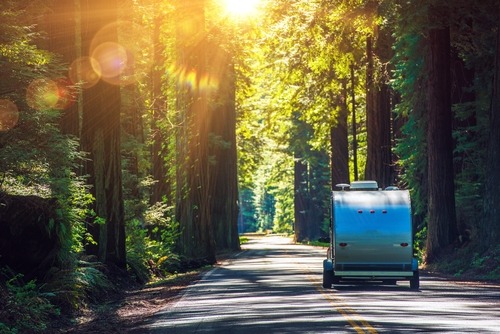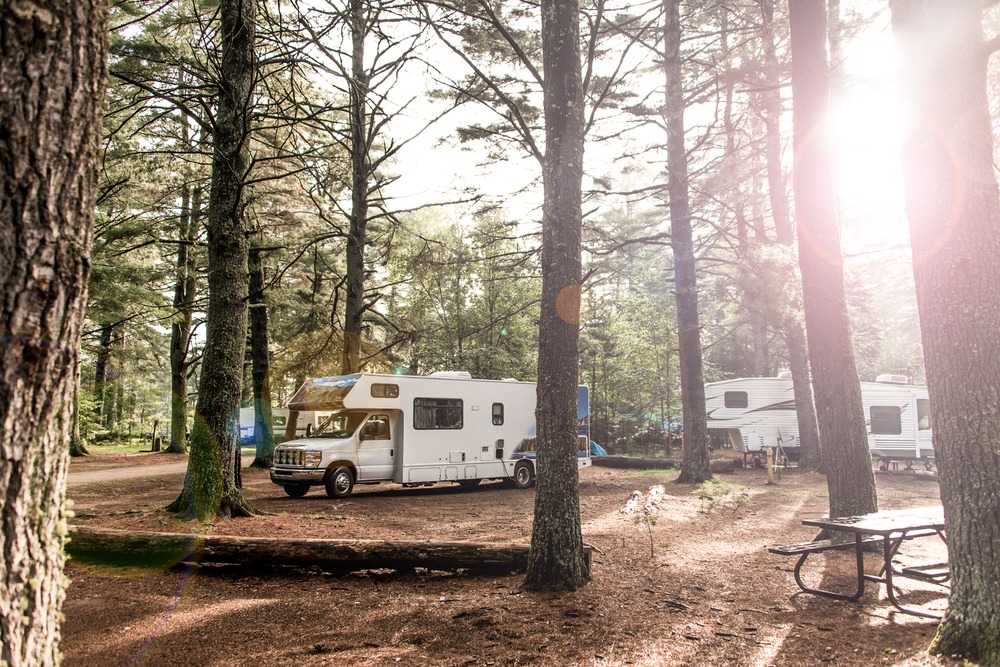
Road trips are quite an adventure. Many people interested in taking a road trip want to find out the best way to experience it. Hence the huge interest in finding the best type of vehicle for a road trip. Once you start searching, the chances are that trailers and recreational vehicles (RVs) are going to pop up, and you have some questions as RV and trailer are generic terms sometimes used interchangeably – but not correclty.
A Trailer and an RV are not the same thing. Since you have your specific personal needs and plans for the adventure, you need to choose the right type of ride for your adventures. That’s why we have decided to list out the major differences between a trailer and an RV for you in this handy article.
What Is a Trailer?
Unlike RVs, trailers don’t feature an engine that powers them. This means that they have to be pulled by hitches. You can often see them attached to some minivans, SUVs, or pickup trucks. There are several types of trailers:
Travel Trailers – These are significantly smaller than their counterparts. They can be as small as 33 feet long. There are larger travel trailer versions that can accommodate up to six or even more people.
 Fifth Wheel Trailers – In addition to all the equipment travel trailers feature, fifth wheel trailers also have a special mount located in the rear. This mount adds more stability when driving, making it easier to park the trailer in narrow camping sites. These trailers can be very long and heavy, which requires a more powerful truck.
Fifth Wheel Trailers – In addition to all the equipment travel trailers feature, fifth wheel trailers also have a special mount located in the rear. This mount adds more stability when driving, making it easier to park the trailer in narrow camping sites. These trailers can be very long and heavy, which requires a more powerful truck.
Popup Trailers – These are very light trailers. They feature fold-up parts and you can usually see a canvas top. This canvas top can be extended. Since they are very light, you can tow them with a minivan.
Truck Campers – Truck campers are designed to ride on a pickup truck. They are very light and extremely affordable, but also very small.
What is an RV?
Recreation Vehicles, or RVs, are a trailer/truck hybrid popularly known as motorhomes. This means that they have their own engines and there is no need for the additional towing vehicle. There are several classes of RVs:
Class A RVs – These are the largest available RVs on the market. Apart from the large cockpit for the ultimate driving experience, class A RVs also feature a full kitchen and living room. They feature extra storage compartments and several slide-outs. They are designed to support 4 or more travelers.
 Class B RVs – These RVs are significantly smaller than class A ones while offering approximately the same amenities but without the extra storage units. They are perfect for small families and couples.
Class B RVs – These RVs are significantly smaller than class A ones while offering approximately the same amenities but without the extra storage units. They are perfect for small families and couples.
Class C RVs – Class C is a cross between class A and B. You can find them in all sizes, often sitting on a regular van chassis. The most popular sizes are 29 and 24 feet.
How are Trailers and RVs Different?
Apart from the obvious difference, i.e. you need an extra vehicle to tow a trailer which you don’t with an RV, there are several other important differences to consider when you are planning on renting or buying an RV or trailer.
Price
The price is the first major difference we decided to point out. Since trailers don’t feature an engine, they are considerably more affordable than RVs, at least in the same size category. But if you need to buy a new towing vehicle and a new trailer, you are probably going to end up in the price range of the same size RV.
Most RVs come with a 1-year warranty.
Freedom
 When on a road trip, you probably want to explore as many areas as possible. A trailer is much more rewarding because you can always park it and continue the exploration of surrounding areas in your towing vehicle.
When on a road trip, you probably want to explore as many areas as possible. A trailer is much more rewarding because you can always park it and continue the exploration of surrounding areas in your towing vehicle.
With a class C RV, you can still have the freedom of exploring the surrounding areas, but you will be limited to an extent. If you like winter adventures, you better get your trailer or RV properly sorted out!
This is why you will have to consider towing bicycles, motorcycles or even a car with your RV if you want to experience true freedom when it comes to adventuring through the unknown.
Costs
If you already own a vehicle capable of towing a trailer, then you can save by getting a trailer. With an RV, there is the cost of engine maintenance. The costs can go up if you only use the RV a few times a year. Since it is not driven regularly, it will require extensive maintenance. You can learn how to prepare your RV for a new season here.
If you are deciding to buy either one of these, you should also know that the insurance costs are not the same. A trailer insurance policy is almost always cheaper than the RV one.
Number of Available Options
The RV and trailer market is just like any other market, meaning that supply is driven by demand. And apparently, the trailer market provides more opportunities for the manufacturers. Don’t get us wrong, there are quite a few models of RVs, but when compared to the trailer offering, it is significantly smaller.
Batteries
RVs feature their own batteries. Whenever you drive your RV, the alternator in the engine will charge the batteries, which is great if you don’t make long stops. On the other hand, the batteries in a trailer charge only while the alternator is charging the battery in the towing vehicle. This is why many people use alternative power sources, such as solar power.
Hit the Open Road with Travel-More Trailer Sales in Ottawa
While RVs and trailers are definitively two different things, they still serve a similar purpose. Now it’s up to you to find what’s best, then enjoy your RV or trailer adventures wherever they may take you!
Contact us today to talk about renting or purchasing a trailer or RV, or anything else RV related!





